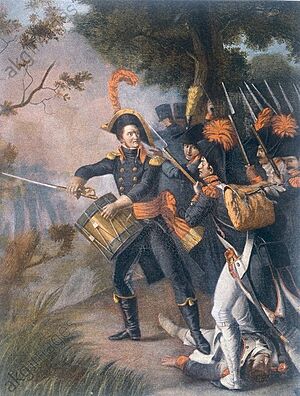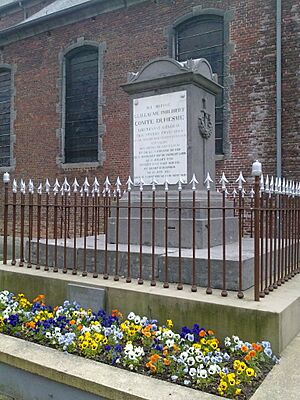Guillaume Philibert Duhesme facts for kids
Quick facts for kids
General of Division
Guillaume Philibert Duhesme
Count of the Empire, Peer of France
|
|
|---|---|

General Duhesme at the Battle of Diersheim, by Charles Thévenin
|
|
| Nickname(s) | Le Général Baïonnette |
| Born | 7 July 1766 Mercurey, France |
| Died | 20 June 1815 Waterloo |
| Buried |
Duhesme Mausoleum
|
| Allegiance |
|
| Branch | French Army |
| Service years | 1791–1815 |
| Wars | |
| Awards |
|
| Signature | |
Guillaume Philibert, 1st Count Duhesme (born July 7, 1766, in Mercurey, France; died June 20, 1815, near Waterloo) was a brave French general. He was also a politician and writer during the time of the French Revolution and Napoleonic Wars.
Duhesme was a commander of the Imperial Guard, a special group of soldiers. He also served as the Governor of Catalonia in Spain and became a Peer of France. The famous leader Napoleon once said that Duhesme was a "fearless soldier" and a "great general." Many people consider Duhesme to be one of the best infantry (foot soldier) generals of the Napoleonic Wars.
Contents
Early Military Career
Guillaume Philibert Duhesme grew up in a well-off family in Bourgneuf, France. He studied law in Dijon. When the French Revolution began, he quickly became a leader in his local national guard.
In 1792, he became a colonel and raised his own group of soldiers. He showed great courage early on. During a battle near Neerwinden in 1793, his soldiers started to run away. Even though Duhesme was wounded, he managed to rally them and turn the fight around. For this brave action, he was promoted to brigadier general.
Key Victories and Promotions
Duhesme played a big part in the French victory at the Battle of Fleurus in 1794. He also helped besiege Maastricht. Because of his success, he was promoted to general of division.
He fought in the Vendée region of France in 1795. Later, he fought along the Rhine river, where he successfully led his troops across it in 1797.
In 1798, Duhesme was sent to Italy. He helped capture Naples and took control of regions like Calabria and Apulia. For his excellent leadership during the capture of Naples, he received a special award: a full armor of honor. He continued to win battles in Italy, capturing towns and taking many prisoners.
In 1800, Duhesme led a group of soldiers in Napoleon's army during the Marengo campaign. His troops helped capture important cities like Milan. While Napoleon fought the main Austrian army, Duhesme's soldiers defended the Po Valley.
He continued to rise in rank and importance. In 1801, he became commander of a large military division. In 1803, Napoleon made him a Knight of the Legion of Honour, a very important award.
Service During the Empire
In 1805, Duhesme commanded a division during the Battle of Caldiero. In 1806, he was part of the army that conquered the Kingdom of Naples.
Around this time, he wrote a well-known book called Précis historique de l'infanterie légère. This book was about light infantry, a type of fast-moving foot soldier. Because of his writing, he was made an honorary member of the Academy of Lyon.
Campaigns in Spain
In 1808, Duhesme led soldiers in Napoleon's campaign to take control of Spain. He was very successful in capturing Barcelona. He became the Governor of Catalonia, a region in Spain.
He captured Barcelona using a clever trick. He convinced the Spanish governor to let a group of French soldiers, pretending to be sick, enter the city. Once inside, these soldiers, who were actually fully armed, jumped out of their stretchers and captured the castle! Later, he successfully defended Barcelona when the Spanish tried to take it back.
After some time, Duhesme was called back to Paris. There were accusations against him, but after a long investigation, it was found that these accusations were not true. In 1813, he was given command of the important fortress of Kehl.
In 1814, he commanded a division under Marshal Victor. He fought in several battles, including La Rothière, Montereau, and Arcis-sur-Aube. Napoleon recognized his bravery by making him a Count of the Empire and a Grand Officer of the Legion of Honour.
After Napoleon gave up his throne in 1814, Duhesme continued to serve France. He became the Inspector General of Infantry and was made a Knight of Saint Louis by King Louis XVIII.
The Hundred Days and Waterloo
In 1815, Napoleon returned from exile, starting a period known as the Hundred Days. Duhesme quickly joined Napoleon again. He was made a Peer of France and became the commander of the Young Guard Division, an elite group of soldiers in the Imperial Guard.
He fought with great bravery at the Battle of Ligny and then on June 18, 1815, at the famous Battle of Waterloo. During the Battle of Waterloo, his Young Guard was surrounded by Prussian forces. They fought fiercely and suffered heavy losses. Duhesme was seriously wounded in the head. Even though he was badly hurt, he insisted on staying in command. An aide helped him stay on his horse, but he was too injured. He was taken prisoner by the Prussians.
He was taken to an inn in Genappe, where he died two days later, on June 20, 1815. He was the last French general to die in the Napoleonic Wars.
There are different stories about the exact moment of his death. Some accounts say he was killed by a soldier seeking revenge. However, his family and his aide-de-camp said that he was mortally wounded at Waterloo and then captured in Genappe, where he received care from Prussian doctors until he passed away.
Family Life
Guillaume Philibert Duhesme married Marie Magdeleine Burger in 1797. They had three children:
- Charles Guillaume Eugène (1799-1842): He became the 2nd Count Duhesme and a Peer of France. He was an aide to King Louis-Philippe I and died serving France in Algeria.
- Anne Madeleine Isaure (1804-1869): She married the Marquess of Sarrieu.
- Xavier Hippolyte Léon (1810-1870): He became a general and a Grand Officer of the Legion of Honour. He died serving France in the Franco-Prussian War.
Legacy and Recognition
- Duhesme's name is carved on the Arc de Triomphe in Paris, on the 8th column, north side. This is a great honor for French military heroes.
- He wrote an important book called Essai historique de l'infanterie légère (Historical Essay on Light Infantry).
- The famous writer Victor Hugo mentioned Duhesme's death in his novel Les Misérables.
- Napoleon himself wrote in his Mémoires that Duhesme was a "fearless soldier, covered with wounds and of the greatest bravery, a consummate general, who always stood firm in good and bad fortune."
- Many streets, monuments, and even lakes in France, Belgium, and Canada have been named after him to honor his memory.
Images for kids
See also
 In Spanish: Guillaume Philibert Duhesme para niños
In Spanish: Guillaume Philibert Duhesme para niños



